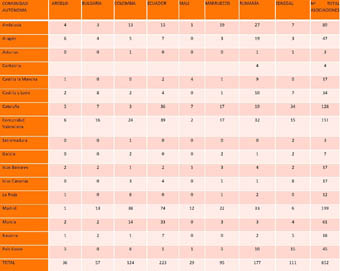
A study led by Professor Joan Lacomba, from the Faculty of Social Sciences, has analysed the impact of the activity of immigrant associations in Spain on the development of their home countries. The work has involved the monitoring of groups from eight countries in Africa, South America and Eastern Europe and concludes that around half of the associations have funded initiatives in their regions of origin. The findings have now been presented in the journal ‘New Diversity’, published by the Max Planck Institute.
Researchers detected the existence of 852 associations in Spain —151 in the Valencian Community— of immigrants coming from Algeria, Morocco, Mali, Senegal, Colombia, Ecuador, Bulgaria and Romania. However, “only 206 responded to our interview, as many of these groups have an ephemeral or intermittent activity, and around half of these associations claimed that they had financed development projects in their home countries thanks to projects funded by Spanish institutions for cooperation or to their own membership fees”, explains Lacomba, lecturer in Social Work and Social Services.
The study showed the existence of “a deep-rooted commitment to the immigrants’ territories of origin higher than we had imagined at the beginning of our research and involving several actions such as the construction of a well, improvements in a school, support for a women’s agricultural cooperative, etc”, says the researcher. This collaboration shows the commitment of people to their homeland and also, according to Lacomba, “the setting up of social networks and contact points that can lead to interesting dynamics of integration or support links”. In addition, making people aware of this engagement with their home countries can be beneficial to the image and visibility of immigrants in host regions.
In contrast, the study reveals that not all immigrant groups are involved to the same extent or in the same way. For example, associations of sub-Saharan African countries are more clearly focused on basic local development, while those from Eastern Europe concentrate more on cultural activities, and Maghrebians or Latin Americans put more emphasis on the revitalisation of civil society. The possibilities of integration into the host destination and the characteristics of the contexts of origin themselves are essential to understand these differences.
Joan Lacomba is a lecturer at the University of Valencia’s Department of Social Work and the director of InMIDE, a research group on migration and development. His research focuses on the links between migration and development processes in different countries and contexts. Between 2012 and 2014 he conducted the R&D&I project ‘Diasporas and co-development from Spain: the role of immigrant associations on the development of their countries of origin’, funded by the Spanish Ministry of Science and Technology.
Joan Lacomba, Alexis Cloquell (2014). ‘Migrants, Associations and Home Country Development: Implications for Discussions on Transnationalism’, en ‘New Diversities’, Vol. 16, No. 2 (ISSN-Print 2199-8108; ISSN-Internet 2199-8116).
Last update: 9 de may de 2015 07:00.
News release


















